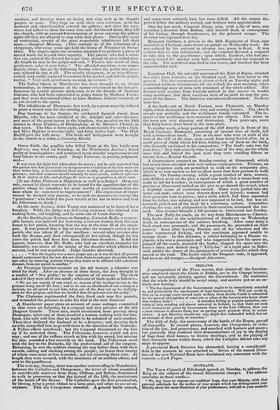Owen Swift, the pugilist who killed Noon at the late
battle near Andover, was tried on Saturday, at the Winchester Assizes ; found guilty of manslaughter ; and sentenced to six months' imprisonment and bard labour in the county gaol. Judge Patteson, in passing judgment, said— It was clear this fight had taken place for money ; and he only regretted that the parties who had given such encouragement to a violation of the law were not then before him, as he considered them more worthy of punishment than the prisoner; and their sentence should certainly lie more severe, without reference to their station in life, and perhaps the more so in proprtion to their rank.
[Is not Judge Patteson a Magistrate as well as a Judge ? Or at any rate, cannot he direct warrants to be issued for the apprehension of the parties whom he considers far more worthy of punishment than time man whom he sentenced to imprisonment? His expression of regret cannot be deemed very sincere, as he took no measures to convict the "gentlemen " who bribed the poor wretch at the bar to bruise and beat his fellowman to death.'
At the same Assizes, John Young was sentenced to be hanged for a burglary. While the Judge was delivering sentence, the criminal was making faces, and laughing, and he went out of Court dancing.
At the Buckingham Assizes, on Saturday, Jeremiah Rolfe, a respect- able farmer, was indicted for removing a servant woman from his own louse to her parish, knowing that she was at the time ill of the small- pox. It was proved that a day or two after the woman's arrival in her parish, she was taken ill of the smallpox : several other persons also took the disease, and died subsequently to her arrival, though for ten years the parish had been free from infectious disorders. It did not appear, however, that Mr. Rolfe, who had an excellent character for humanity, was aware of the nature of the disorder which afflicted his servant, and he was acquitted. Judge Gazelee observed, . . . . .
"that the inquiry was a most proper one; as it was fit that all persons should understand that the law did not allow them to endanger the public health and safety by removing patients whom they knew to be afflicted with infectious diseases, from one parish to another."
At Presteign Quarter-sessions on the 4th instant, a labourer was tried for theft. After an absence of three hours, the Jury brought in a verdict of " Not guilty," to time surprise of all present. The clerk asked if they were all of one mind ; when one of them spoke as follows-
" We are not exactly of one mind, on account of the brother-in-law to the prisoner being one of the Jury; and as we saw no likelihoods of our coming to a decision, we all agreed to cast lots, when one of the Jury cut up his walking- stick for this purpose, and thus we decided that the prisoner was not guilty."
The Chairman reprimanded the Jury, fined each man five pounds, and remanded the prisoner to take his trial at the next Sessions.
A Manchester paper gives an account of some outrages committed in that town on Saturday, by a corporal and two privates of the 6th Dragoon Guards. These men, much intoxicated, were passing along Deansgate, when one of them insulted a woman walking with her hus- band, who only told him that he ought to be ashamed of such conduct. They then declared the husband to be a deserter; and, drawing their swords, compelled him to go with them in the direction of the Barracks. A Police• officer interfered; but the Corporal threatened to rip him up if he molested them. The Policeman, however, would not give way ; and one of the ruffians struck at him with his sword, but missing his aim, wounded a boy severely on the head. The Policeman went with the boy to the Barracks, for the professional aid of the surgeon. Returning, he met the soldiers clearing the way before them with their swords, cutting and slashing among the people ; no fewer than twenty of whom were more or less wounded; one lad receiving three cuts. At length they were secured, with the assistance of an artillery officer, and sent to the guardhouse.
The next day, Sunday, there was another serious affray in Manchester, between the Catholics and Orangemen ; the latter of whom assembled in considerable numbers from Bury, Oldham, and Bolton, determined to walk in procession on that day instead of the 12th, the anniversary of the battle of the Boyne. The Catholics gave the first provocation, by hissing, tying a green ribbon to a lamp-post, and other means of an- noyance. This the Orangemen resented. A general battle ensued, and many were seriously hurt, but none killed. All the rioters dis- persed before time military arrived, and thirteen were apprehended.
One day last week, Corporal Sharp, who, with a file of men, was escorting a deserter from Bolton, shot himself dead, in consequence of his having, through drunkenness, let the prisoner escape. The deserter was captured next day.
Benjamin Gardner, a private in the 50th Regiment of Foot, now stationed at Chatham, came drunk on parade on Wednesday week. He was ordered by his serjeant to advance two paces in front. It was evident that he was intoxicated ; and the sergeant directed a corporal' to take him to the guardhouse ; upon which, Gardner, who had pre- viously loaded his musket with ball, immediately shot the sergeant in time side. The murdered man died in two hours, and Gardner has been committed for trial.


















 Previous page
Previous page